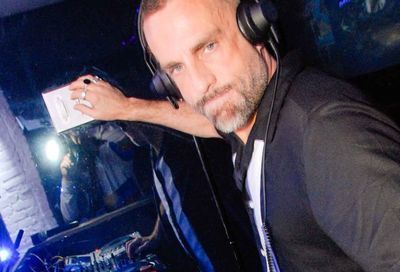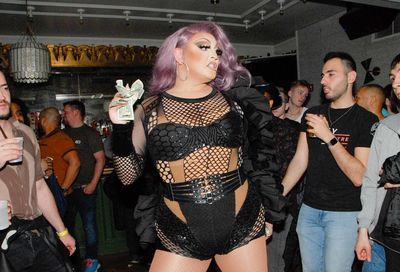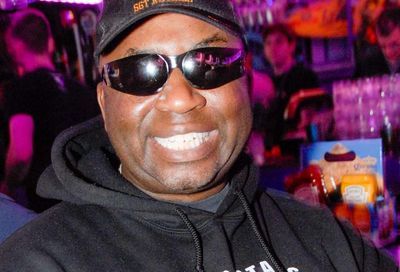LGBTQ Candidate Spotlight: The DC Libertarian Party is running an all-gay slate in November’s elections
Martin Moulton, Bruce Majors, and Ethan and Joe Bishop-Henchman on why they believe the Libertarians can be D.C.'s second party

This article is part of a series highlighting local LGBTQ candidates running in the 2018 elections. The opinions and political beliefs expressed in this candidate spotlight do not necessarily reflect those of Metro Weekly, its employees, or its contributors.
The D.C. Libertarian Party is quietly pulling off a historical feat, and no one seems to have noticed: For the first time in memory, a major political party in the District of Columbia is running an entirely gay slate of candidates.
Each of the four men running this year is seeking a citywide seat: Martin Moulton is challenging Mayor Muriel Bowser; Bruce Majors is running against longtime congressional Del. Eleanor Holmes Norton; Ethan Bishop-Henchman is running against Council Chairman Phil Mendelson; and his husband, Joe Bishop-Henchman, is running against Attorney General Karl Racine.
Yet despite the history-making nature of their candidacies, they say their sexual orientation isn’t a big deal, particularly among members of their own party.
“I’d like to emphasize that the Libertarian Party has a much better record on civil rights, and I think those are much more in line with most gay voters,” says Ethan Bishop-Henchman.
“We were pro-gay rights long before other parties,” chimes in Majors, pointing to the party’s endorsement of marriage equality in 1972.
“I think too often there’s this dichotomy of: either you’re a socialist and you’re pro-civil rights, or you’re a capitalist and you’re anti-civil rights,” Bishop-Henchman adds. “Can’t we offer that beautiful intersection where we can talk about civil rights to the average voter and do that with real integrity and still represent something else that’s not just the Democratic Party?”
“I tell people I’m the openly gay mayoral candidate,” volunteers Moulton. “Voters know they can trust me because I’m actually being honest about it. You win people over when you talk about basic fundamental things like honesty. Most voters don’t care about the gay issue. They care about school choice, marijuana legalization… And I think I can talk to a voter who might be hugely homophobic and win them over on another issue by changing the narrative.”
The Libertarians are unique within D.C. politics, often taking on the role of the de facto minority party by running candidates in races where there is no Republican contender. While they are only 1,295 strong, according to statistics from the D.C. Board of Elections, it’s the Libertarians who, especially via social media, often criticize the Democratic-led Council’s various policies. (Two independents on the Council are both former Democrats and generally liberal on economic policy.)
“I think we offer a real, a rational and reasonable alternative to the Democrats,” Ethan Bishop-Henchman says. “I think that it’s a shame that right now democracy in D.C. is pretty much done at the primary level at the Democratic Party, and I think we offer a real alternative for both people on the left and people on the right.”
Billing themselves as candidates running on free-market, common-sense ideas, the Libertarians have essentially filled a vacuum in the D.C. political landscape, where one-party dominance has been the norm for a number of years. Though they may differ on specific solutions to some problems, all four are largely in favor of marijuana legalization, school choice, fewer regulations on housing and business, and providing oversight of how taxpayer dollars are being spent.
“I honestly think it’s a platform that most D.C. voters can get behind,” says Joe Bishop-Henchman, although he does acknowledge that Libertarians have not made the “hard sell” to the District’s voters who may skew liberal but are vehemently anti-corruption.
Each candidate has their own reasons for running. For Moulton, it’s the burdensome regulations that prevent more housing from being built and force businesses to navigate a massive maze filled with red tape. He also criticizes incumbent Mayor Muriel Bowser’s (D) handling of education issues, particularly school choice, and her Vision Zero program to reduce travel fatalities.
“An essential change has to be made urgently, not in four years. Now. She has shown no inclination to change her policies or practices with regard to government schools,” he says.

“She initiated this Vision Zero Program to reduce travel fatalities by 2020, understanding that with more congestion, more cars, more people, there will be more interactions, more crashes, more fatalities,” adds Moulton. “She’s failed. Traffic fatalities have risen since she initiated Vision Zero. Those are people’s lives — your kids’ lives, moms and dads. She spends more time courting corporate sports team owners and building things that take money away from taxpayers.”
Moulton says it’s outrageous that, with the District’s educational system under mayoral control, local media has done voters a disservice by not demanding that Bowser sit down with Moulton and her other challengers, Dustin Canter (I) and Ann Wilcox (Statehood-Green), to have a discussion about the future of education — not to mention other issues like a lack of affordable housing, homelessness, or crime.
He also points to the scandal that forced former Schools Chancellor Antwan Wilson to resign, after it was discovered his daughter was allowed to bypass the lottery in order to earn a seat at a coveted high school with a long waiting list, as an example of where the mayor fell down on the job. He says parents of public school students will still bring that scandal up, unprompted, when he’s campaigning, because it made them “livid.”
“The corporate press, in every article they talk about schools, there’s not one parent who gets a quote,” Moulton says. “They’re talking to the establishment. Even the media is marginalizing parents by not giving voice to their frustration or rage. I talk to parents on the street, I talk to my neighbors who have kids in charter schools because they refuse to send them to normal government schools. They’re furious. They’re looking for someone to give them an alternative.
“Our [Party’s] position is school choice and expanding it just beyond charter schools, but to private schools and parochial schools and expand that market,” he adds. “When I talked to black, poor, low income African Americans they say, ‘Why isn’t there a Baptist church-run school?’ My father went to a Methodist school when he came to this country. Why isn’t there a Methodist school here for K through 12? Why isn’t there a Sikh school? Why isn’t there a Buddhist school?
“But our establishment says taxpayers have to give our money to government schools and some to the charter schools. For parents who might want to send their kids to private schools, give them a religious education or some spiritual or loving education where they learn some values, the city says, ‘No, we can’t let you do that.'”
The Bowser campaign did not respond to emails or return phone calls seeking comment.
For Majors, challenging Norton is about providing an alternative to the Democrat who’s been the District’s non-voting delegate in Congress for the past 28 years. He also believes his party identification would make it easier to find common ground with Democrats and Republicans around issues like criminal justice reform, and believes he’s better positioned to make an argument in favor of D.C. statehood.
“I think Eleanor has done a number of things for D.C. and I don’t think she’s the worst person in Congress, but Eleanor is part of the Democratic Party and the D.C. Democratic Party, and very rarely does she criticize it when it’s wrong,” he says. “She doesn’t criticize any of the corruption or any of the failures of local politicians in her party.”
Similarly, Ethan Bishop-Henchman doesn’t have any personal animosity towards Council Chairman Phil Mendelson, who he’s challenging on Nov. 6.
“I think the problem [with Mendelson] is he’s not a true independent voice on the council. He is part of the Democratic machine. I think that he’s very good at basically talking out of both parts of his mouth,” he says. “He likes to tout that he was progressive before it was cool, and at the same time he’s also trying to pretend to be really pro-business. I don’t think that either of those constituencies are for very long going to believe both those things. I would like to actually be an independent voice on the council that could push through, or at least be a voice for, business and development.”

Were he elected Chairman, Bishop-Henchman would help set the Council agenda, including arranging votes on any legislative items being pushed by the mayor’s office. He argues he’d be a check on her power, rather than a rubber-stamp.
“The four things I would focus on are expanding school choice as much as possible. I would divert more money into scholarships for low income residents and their children. I would shore up the D.C. Opportunity Scholarship, put more money into it, and make sure that more people could have access to that,” he says.
As chairman, Bishop-Henchman believes he’d be a more vocal advocate for D.C. statehood, would seek to reduce the number of regulations that stifle the supply of housing and make it unaffordable for working people, and work to provide more oversight over the District’s troubled Metro system.
“I think Metro is a disgrace,” he says. “It does not have a funding problem, it has a management problem. I think it’s in the grip of the unions. I don’t think unions are always a bad thing, but if unions pretend to be the voice of the working class, it’s a disruptive Metro system that actually hurts the working class most. The rest of us can afford Ubers and Lyfts if we need to.
“Instead, we say we’re going to shut down Metro at midnight so we can do Safe Track and all these other things. A lot of people who have built their lives around where Metro is going to be and what times, they’re constantly thrown into flux because we can’t keep a working Metro system in the capital of the most powerful country of the world.”
His husband, Joe Bishop-Henchman, believes he can play a role in oversight if he is elected D.C. Attorney General.
“In the Attorney General’s office, there’s a lot of investigative and oversight power that’s not being used,” he says. “One example I see is WMATA. If WMATA was a private company, they’d have investors all over them, safety inspections, they might even be shut down. We, the D.C. government, have done nothing to hold them accountable. So the feds have had to step in and do safety and oversight, and that’s a shame. In every other matter, we’ve said, ‘We don’t need the feds to step in, we can take care of it ourselves,’ but in this case we’ve sort of abdicated to them.”
Bishop-Henchman sees consumer protection and cracking down on mismanagement as the top priorities of the office.
“In the last election, D.C. voters voted to make this an elected and independent body,” he says. “And part of the reason they voted that way was they wanted the AG to have that power without having to be responsible to the powers that be. So this is an office that can investigate the council if wrongdoing is apparent.”
Asked about why he’s challenging Racine, Bishop-Henchman points to the office’s priorities.
“There have been a lot of missed opportunities, in terms of holding WMATA accountable, in terms of helping get housing built. There’s a lot of housing not being built because of abuse of the legal process by neighborhood interests and others,” he says. “I followed very closely the debacle around St. Thomas Episcopal Church on Church Street, that wanted to rebuild and add housing, and the church was nearly driven nearly bankrupt by the legal process. They turned to the AG’s office and a lot of other city officials for help, and got a lot of closed doors. I really think that needs to change.”
Bishop-Henchman also says the AG’s office can play a role in promoting more housing.
“For whatever reason, we have built a ‘Housing is Bad’ strategy in [D.C.] government. We view housing as a bad thing, and therefore, we need to put all of this legal process in the way of it. And elected officials don’t want to remove those obstacles,” he says. “I view housing as a good thing. I think we need all of the above: affordable, luxury, and everything in between. I think it’s a big missing piece. The AG’s power is limited on what he can do on that, but he can help with some of the legal complications surrounding that.”
In a statement, Racine dismissed some of Bishop-Henchman’s contentions about what authority the AG’s office has.
“Clearly, my opponent does not understand the authority of the of Office of Attorney General,” the statement said. “My office does not regulate WMATA nor does it build housing or other structures. My office does, however, seek to promote affordable housing by winning lawsuit after lawsuit against slumlords who deny vulnerable residents basic services with the objective of forcing them out of their homes. I am proud of the work of my colleagues.”
Racine added: “My opponent’s comments demonstrate that he lacks the knowledge and passion to help our City’s most vulnerable residents.”

Still, all four Libertarians hope that their campaigns will help voters see them as a viable party.
“The hurdle is on us to make the case that we haven’t in past cycles,” Joe Bishop-Henchman says. “So people feel like there is only one option if they want responsible government in D.C. It’s up to us to make sure people know there are other options.”
Martin Moulton says lack of visibility has historically plagued the fledgling party, which only gained ballot status a few years ago.
“I feel that people do get [our message] when I talk to them,” he says. “We know that the majority of D.C. voters don’t vote. Those people are looking for Libertarians on the ballot. They want it. We need exposure to them, but when I talk to people on the streets, when I talk to people around the city, they understand Libertarian values. They just don’t see the establishment Democrats and the so-called ‘likely’ candidates articulating those values, so they don’t vote. When they hear us talk, they’re like, you’ve got my vote.”
Moulton also criticizes local media, which often dismisses Libertarians’ electoral chances and denies them coverage.
“The corporate media is staunchly Democratic. We see that nationally. We see that locally,” he says. “They mention us in the most bigoted ways — I use the word ‘bigoted’ because we just have different ideas, but they say: ‘Your ideas aren’t important.’ Educating all of our kids is important. Giving them a fair shot at a chance to live in this economy is an important issue, and the Democrats aren’t doing that.”
Majors adds that even right-wing media sources can be biased against Libertarians, particularly if they are viewed as threats to Republicans.
“Ultimately, I want to see D.C. as a two-party town again,” says Joe Bishop-Henchman. “And that second party is not going to be the Republicans. I mean, Trump got 4% of the vote. So it’s about presenting an alternative that’s socially liberal but fiscally responsible.”
He notes that for the two non-Democratic At-Large seats on the Council, a candidate only needs to win from 11% to 14% of the citywide vote, and looks forward to the day when the party has built up enough rapport with voters to be able to run a candidate who can win.
“If someday we get to that point, and we have a Libertarian as one of the 13 councilmembers, and we demonstrate we can govern effectively and efficiently, and advance good policies, that will help make the case to a lot of people,” he says.
Support Metro Weekly’s Journalism
These are challenging times for news organizations. And yet it’s crucial we stay active and provide vital resources and information to both our local readers and the world. So won’t you please take a moment and consider supporting Metro Weekly with a membership? For as little as $5 a month, you can help ensure Metro Weekly magazine and MetroWeekly.com remain free, viable resources as we provide the best, most diverse, culturally-resonant LGBTQ coverage in both the D.C. region and around the world. Memberships come with exclusive perks and discounts, your own personal digital delivery of each week’s magazine (and an archive), access to our Member's Lounge when it launches this fall, and exclusive members-only items like Metro Weekly Membership Mugs and Tote Bags! Check out all our membership levels here and please join us today!





















